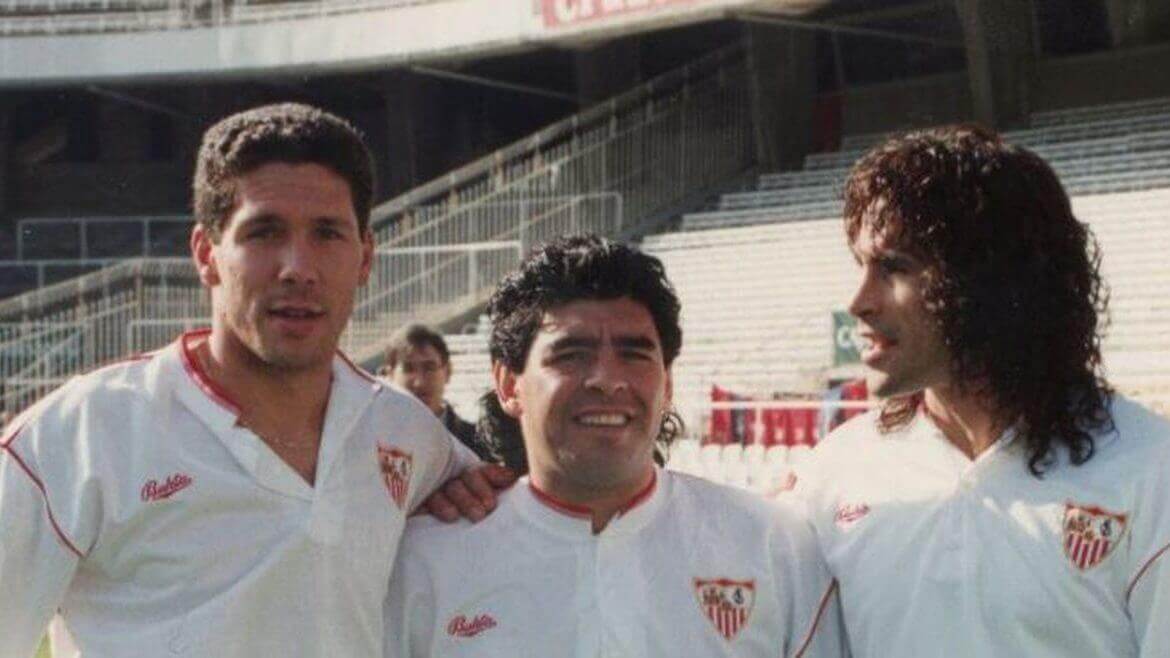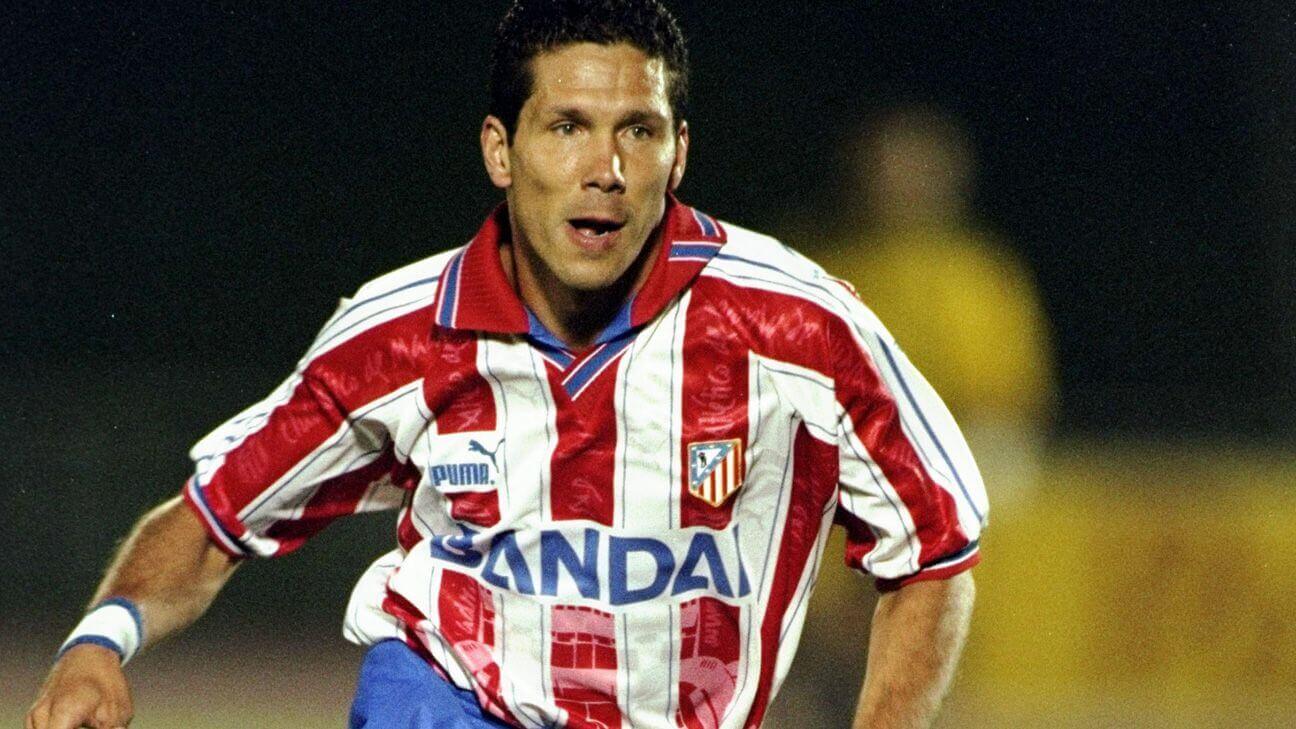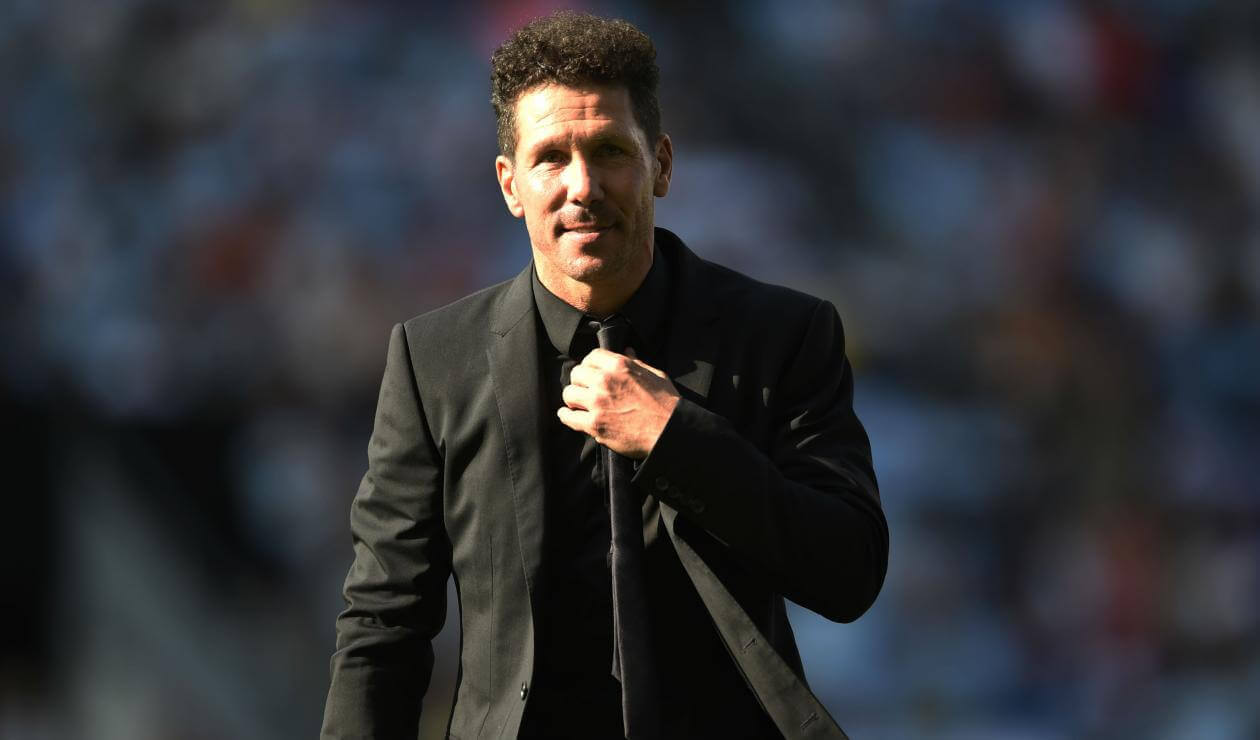Diego Simeone

Diego Simeone, nicknamed “El Cholo“, is an emblem of the soccer team Atletico Madrid as well as an important figure in Argentine soccer. Both as a player and as a coach, he’s earned historic titles– always with his iconic fiery personality. Today, let’s take a look at the career of one of the most important figures in Spanish and international soccer.
Diego Simeone, the soccer player
Beginning in Argentina
El Cholo first played professionally for the Velez Sarsfield soccer team in Argentina in 1987. Although it was a first-division team, he was just 17 years old. He gained the nickname “Cholito” because of his resemblance to Argentinian National player Carmelo Simeone.
Simeone always played with energy and dedication along with an excellent high ball game. While he played as a defensive midfielder, he knew just how to position himself and contribute offensively as well. In fact, he scored 15 goals in his 82 games with Velez! He continued a similar average number of goals for nearly every other team he played for after Velez.
Playing in Europe
Later, Velez sold 20-year-old Simeone to AC Pisa, where he would play for two years. After, Sevilla FC manager at the time Carlos Bilardo bought the player for a little over one million euros.
Simeone played for the Andalusian team for two years alongside teammate Diego Maradona. Simeone’s high performance allowed him to take a crucial step forward in his career.

At the time, it would’ve been hard for Simeone to imagine that, later on in 1994, he would be sold to Atletico Madrid for 450 million Spanish pesetas— approximately 2.5 million euros today– setting a record for the soccer club’s trading history.
He joined the team, which usually floated between the middle rankings of the classification charts. But he would only need three seasons to become a soccer idol: he captained the team during the incredible 1995/96 seasons of winning both the major Spanish soccer tournaments La Liga and La Copa del Rey.
He later moved around in Europe to play for Inter Milan. During his time there, the team won a UEFA Europa League cup. After, Simeone played for SS Lazio and won a Scudetto, an Italian Cup, an Italian Super Cup, and European Super Cup.
The years between 2003 and 2005 were less successful for Simeone, who moved back to Spain to play for Atletico Madrid. In the last year of his career as a soccer player, he donned the jersey of a team he always loved: the Racing Club.
The Argentina National Soccer Team and Diego Simeone
Starting from his junior-league days, Simeone dedicated many years to the Argentina National Team. To be precise, he spent 14 years on the team, playing 106 games –and at one point leading the statistics. He made 11 goals and won four titles:
- Two Copa America titles: 1991 and 1991
- Artemio Franchi Trophy
- FIFA Confederations Cup 1992

On top of all this, Simeone played in three World Cups— the United States, 1994, France, 1998 and Korea-Japan 2002– and he won a silver medal in the Atlanta Olympic Games, 1996.
Diego Simeone, a different kind of coach
While Simeone might be associated with a conservative, feisty and defensive game these days, his beginnings as a coach in Argentina were quite different. Shortly after he retired as a soccer player, he first started coaching for his beloved Racing Club.
After removing himself from a tricky situation to keep the team standards, he left and started in Club Estudiantes de La Plata. Alongside Captain Juan Sebastián Verón, he helped them win a local title after 23 long years of disappointment.
In addition, he also coached a historic landslide win in a local game against rival team Gimnasia y Esgrima de La Plata, beating them 7-0.
After Estudiantes de La Plata, Simeone continued on to coach River Plate, where he experienced ups and downs. The first blow hit hard: the team was eliminated from the Copa Libertadores tournament even after having a two-goal lead and two more players on the field than their opponents, San Lorenzo.
However, the tables turned weeks after when the team won the Clausura championship. But Simeone would leave the team before the end of the year after their elimination in the quarter-finals of the Copa Sudamericana, in which they classified as dead last for the first time in history.
Simeone finished his coaching days in Argentina with short instances at San Lorenzo de Almagro– 2009/2010– and a second start at Racing, where he was also unable to yield positive results. Between his stints at the two teams, he also spent a short time at Catania Italiano, helping them to stay in their division for the 2010/2011 season.
Atletico Madrid and the beginning of a golden era
In 2011 and with, yet again, an under-performing Atletico Madrid, Simeone returned to the Vicente Calderon stadium as a technical director.

Since his arrival, Atletico Madrid has been living one of its most glorious eras. The team not only broke through the Barcelona-Real Madrid rivalry, but they also won Spain’s 2013-14 La Liga.
In the same year, Atletico Madrid played in the UEFA Champions League finals against none other than their eternal rival. Though Atletico had the lead during nearly the entire match, Sergio Ramos brought the game to a tie with a goal and in overtime, Real Madrid sealed their victory, 4 to 1.
But their loss hardly darkened their triumphs and the team would meet their rivals again in the 2015/2016 season in Milan at the Giuseppe Meazza stadium. Once again, Atletico Madrid lost to their rivals but this time, in shootouts.
As a result of all of his feats, his champion-mindset and his unquenchable thirst for being the best, Diego Simeone is, and always will be, an eternal figure. Not only for Atletico Madrid, but also for Spanish and Argentinian soccer as well. Thankfully, we’ll still enjoy Cholo for a few more years to come.
Diego Simeone, nicknamed “El Cholo“, is an emblem of the soccer team Atletico Madrid as well as an important figure in Argentine soccer. Both as a player and as a coach, he’s earned historic titles– always with his iconic fiery personality. Today, let’s take a look at the career of one of the most important figures in Spanish and international soccer.
Diego Simeone, the soccer player
Beginning in Argentina
El Cholo first played professionally for the Velez Sarsfield soccer team in Argentina in 1987. Although it was a first-division team, he was just 17 years old. He gained the nickname “Cholito” because of his resemblance to Argentinian National player Carmelo Simeone.
Simeone always played with energy and dedication along with an excellent high ball game. While he played as a defensive midfielder, he knew just how to position himself and contribute offensively as well. In fact, he scored 15 goals in his 82 games with Velez! He continued a similar average number of goals for nearly every other team he played for after Velez.
Playing in Europe
Later, Velez sold 20-year-old Simeone to AC Pisa, where he would play for two years. After, Sevilla FC manager at the time Carlos Bilardo bought the player for a little over one million euros.
Simeone played for the Andalusian team for two years alongside teammate Diego Maradona. Simeone’s high performance allowed him to take a crucial step forward in his career.

At the time, it would’ve been hard for Simeone to imagine that, later on in 1994, he would be sold to Atletico Madrid for 450 million Spanish pesetas— approximately 2.5 million euros today– setting a record for the soccer club’s trading history.
He joined the team, which usually floated between the middle rankings of the classification charts. But he would only need three seasons to become a soccer idol: he captained the team during the incredible 1995/96 seasons of winning both the major Spanish soccer tournaments La Liga and La Copa del Rey.
He later moved around in Europe to play for Inter Milan. During his time there, the team won a UEFA Europa League cup. After, Simeone played for SS Lazio and won a Scudetto, an Italian Cup, an Italian Super Cup, and European Super Cup.
The years between 2003 and 2005 were less successful for Simeone, who moved back to Spain to play for Atletico Madrid. In the last year of his career as a soccer player, he donned the jersey of a team he always loved: the Racing Club.
The Argentina National Soccer Team and Diego Simeone
Starting from his junior-league days, Simeone dedicated many years to the Argentina National Team. To be precise, he spent 14 years on the team, playing 106 games –and at one point leading the statistics. He made 11 goals and won four titles:
- Two Copa America titles: 1991 and 1991
- Artemio Franchi Trophy
- FIFA Confederations Cup 1992

On top of all this, Simeone played in three World Cups— the United States, 1994, France, 1998 and Korea-Japan 2002– and he won a silver medal in the Atlanta Olympic Games, 1996.
Diego Simeone, a different kind of coach
While Simeone might be associated with a conservative, feisty and defensive game these days, his beginnings as a coach in Argentina were quite different. Shortly after he retired as a soccer player, he first started coaching for his beloved Racing Club.
After removing himself from a tricky situation to keep the team standards, he left and started in Club Estudiantes de La Plata. Alongside Captain Juan Sebastián Verón, he helped them win a local title after 23 long years of disappointment.
In addition, he also coached a historic landslide win in a local game against rival team Gimnasia y Esgrima de La Plata, beating them 7-0.
After Estudiantes de La Plata, Simeone continued on to coach River Plate, where he experienced ups and downs. The first blow hit hard: the team was eliminated from the Copa Libertadores tournament even after having a two-goal lead and two more players on the field than their opponents, San Lorenzo.
However, the tables turned weeks after when the team won the Clausura championship. But Simeone would leave the team before the end of the year after their elimination in the quarter-finals of the Copa Sudamericana, in which they classified as dead last for the first time in history.
Simeone finished his coaching days in Argentina with short instances at San Lorenzo de Almagro– 2009/2010– and a second start at Racing, where he was also unable to yield positive results. Between his stints at the two teams, he also spent a short time at Catania Italiano, helping them to stay in their division for the 2010/2011 season.
Atletico Madrid and the beginning of a golden era
In 2011 and with, yet again, an under-performing Atletico Madrid, Simeone returned to the Vicente Calderon stadium as a technical director.

Since his arrival, Atletico Madrid has been living one of its most glorious eras. The team not only broke through the Barcelona-Real Madrid rivalry, but they also won Spain’s 2013-14 La Liga.
In the same year, Atletico Madrid played in the UEFA Champions League finals against none other than their eternal rival. Though Atletico had the lead during nearly the entire match, Sergio Ramos brought the game to a tie with a goal and in overtime, Real Madrid sealed their victory, 4 to 1.
But their loss hardly darkened their triumphs and the team would meet their rivals again in the 2015/2016 season in Milan at the Giuseppe Meazza stadium. Once again, Atletico Madrid lost to their rivals but this time, in shootouts.
As a result of all of his feats, his champion-mindset and his unquenchable thirst for being the best, Diego Simeone is, and always will be, an eternal figure. Not only for Atletico Madrid, but also for Spanish and Argentinian soccer as well. Thankfully, we’ll still enjoy Cholo for a few more years to come.
All cited sources were thoroughly reviewed by our team to ensure their quality, reliability, currency, and validity. The bibliography of this article was considered reliable and of academic or scientific accuracy.
- Historia: ¿Te acuerdas de cuándo llegó Siemone al Atlético de Madrid? – HD. YouTube La Liga Santander. 11 de septiembre de 2014.
- Diego Simeone. Wikipedia. Disponible en: https://es.wikipedia.org/wiki/Diego_Simeone#Debut
This text is provided for informational purposes only and does not replace consultation with a professional. If in doubt, consult your specialist.








